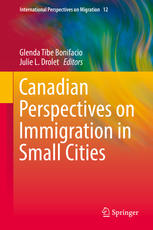

Most ebook files are in PDF format, so you can easily read them using various software such as Foxit Reader or directly on the Google Chrome browser.
Some ebook files are released by publishers in other formats such as .awz, .mobi, .epub, .fb2, etc. You may need to install specific software to read these formats on mobile/PC, such as Calibre.
Please read the tutorial at this link. https://ebooknice.com/page/post?id=faq
We offer FREE conversion to the popular formats you request; however, this may take some time. Therefore, right after payment, please email us, and we will try to provide the service as quickly as possible.
For some exceptional file formats or broken links (if any), please refrain from opening any disputes. Instead, email us first, and we will try to assist within a maximum of 6 hours.
EbookNice Team

Status:
Available4.5
19 reviewsThis book examines immigration to small cities throughout Canada. It explores the distinct challenges brought about by the influx of people to urban communities which typically have less than 100,000 residents.
The essays are organized into four main sections: partnerships, resources, and capacities; identities, belonging, and social networks; health, politics, and diversity, and Francophone minority communities. Taken together, they provide a comprehensive, multi-disciplinary perspective on the contemporary realities of immigration to small urban locations.Readers will discover how different groups of migrants, immigrants, and Francophone minorities confront systemic discrimination; how settlement agencies and organizations develop unique strategies for negotiating limited resources and embracing opportunities brought about by changing demographics; and how small cities work hard to develop inclusive communities and respond to social exclusions.
In addition, each essay includes a case study that highlights the topic under discussion in a particular city or region, from Brandon, Manitoba to the Thompson-Nicola Region in British Columbia, from Peterborough, Ontario to the Niagara Region.
As a complement to metropolitan-based works on immigration in Canada, this collection offers an important dimension in migration studies that will be of interest to academics, researchers, as well as policymakers and practitioners working on immigrant integration and settlement.